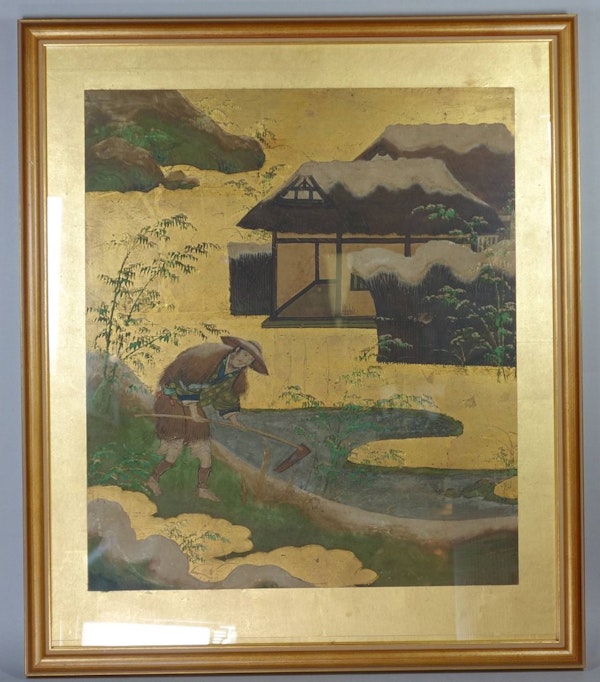Japanese Kano school painting, 17th century
Japanese Kano school painting, 17th century
POA
Description
Japanese Kano school painting, 17th century, in ink against a gold leaf background, depicting Meng Zong dressed in reeds digging in the snow for bamboo shoots on a bank beside a river, with a thatch-roof dwelling covered with snow in the background.
Notes:
The themes and styles of Chinese art have had a signifiant influence on Japanese painting for hundreds of years, with genres including bird and flower studies, Buddhist religious paintings, inkwash landscapes, and, as seen here, depictions of traditional Confucian tales proving especially popular in medieval and early modern Japan. Despite thematic and stylistic similarities to Chinese models, Japanese paintings display a distinctly Japanese aesthetic. Mirroring this wider narrative of influence and innovation, the Kano school of painters, founded by Kano Masanobu in the 15th century, initially adhered closely to Chinese models, contributing to a revival of Chinese influence within Japanese medieval culture. However, over time the school developed a bolder, more distinctive style with firm outlines and brighter colours, as seen in this example. The Chinese text Quan xiang ershisi xiao shi xuan 全相二十孝詩選 (Selected verses on all aspects of the twenty-four filial exemplars) was compiled in the fourteenth century by the Yuan dynasty Confucian scholar Guo Jujing. The compilation of tales outlining the central Confucian concept of loyalty towards ones parents proved extremely influential across Asia and was translated into Japanese as Nijushiko 二十四孝 in the fifteenth or sixteenth century as well as becoming a popular theme in Japanese art. The tale depicted in this painting is ku zhu sheng sun, 哭竹生笋 (He Cried and the Bamboo Sprouted), which tells the story of a young man named Meng Zong, who supported his mother after his father died. His mother became very sick, and when the doctor prescribed that she drink soup made from fresh bamboo shoots, Meng set out in search of the young tender vegetable. However, as it was the depths of winter, none were to be found. He went to a bamboo grove and, in his frustration and helplessness, started to cry. To his surprise and delight, bamboo shoots sprung from the ground where his tears had fallen. He quickly gathered them up and took them back to his mother, who made a full recovery thanks to the dutiful perseverance of her son.
| item details | |
|---|---|
| Material and Technique | Ink and gold leaf |
| Origin | Japanese |
| Period | 17th Century |
| Dimensions | Dimensions of frame: 40cm. x 46.4cm. (15 3/4in. x 18 1/4in.) |
Product REF: Q707F


